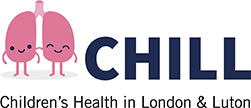
Air pollution from traffic harms children’s health and the development of their lungs. This can affect their health for the rest of their lives. Towns and cities like Luton and London are monitoring air pollution levels and taking measures to try to reduce pollution (for example, introducing busways and low emission zones, installing charging points for electric vehicles, and offering travel planning advice to schools). The aim of the CHILL project is to assess if these measures are improving children’s lung development and their health, and how these improvements are achieved.
The CHILL study started in 2018 and plans to recruit Year 2, 3, and 4 children from primary schools in central London and Luton to take part because the local councils in these areas are trying to reduce air pollution. We aim to recruit 60 children from each school; over 3,000 children in total. We will measure the children’s lung function, their respiratory symptoms (like wheezing, sneezing, coughing), whether they have had to miss school for chest problems, and what impact this may have had on their parents. Finally, we are interested in children’s physical activity levels and how much air pollution they are exposed to.
The CHILL study is funded by the National Institute for Health Research Public Health programme (NIHR-PHR) and the NIHR Collaboration for Leadership in Applied Health Research and Care (CLAHRC), and conducted by a multidisciplinary team lead by Professor Chris Griffiths at Queen Mary University of London. Researchers at the MRC Epidemiology Unit lead on the assessment and analyses of physical activity and location data.
See the CHILL website for further information: www.qmul.ac.uk/chill/
Publications
CHILL study publications on the MRC Epidemiology Unit publications database.
Data sharing
The MRC Epidemiology Unit is committed to sharing data to maximise the value of our work for the public good. Please see our Data Sharing pages for more information.

 MRC Epidemiology Unit
MRC Epidemiology Unit